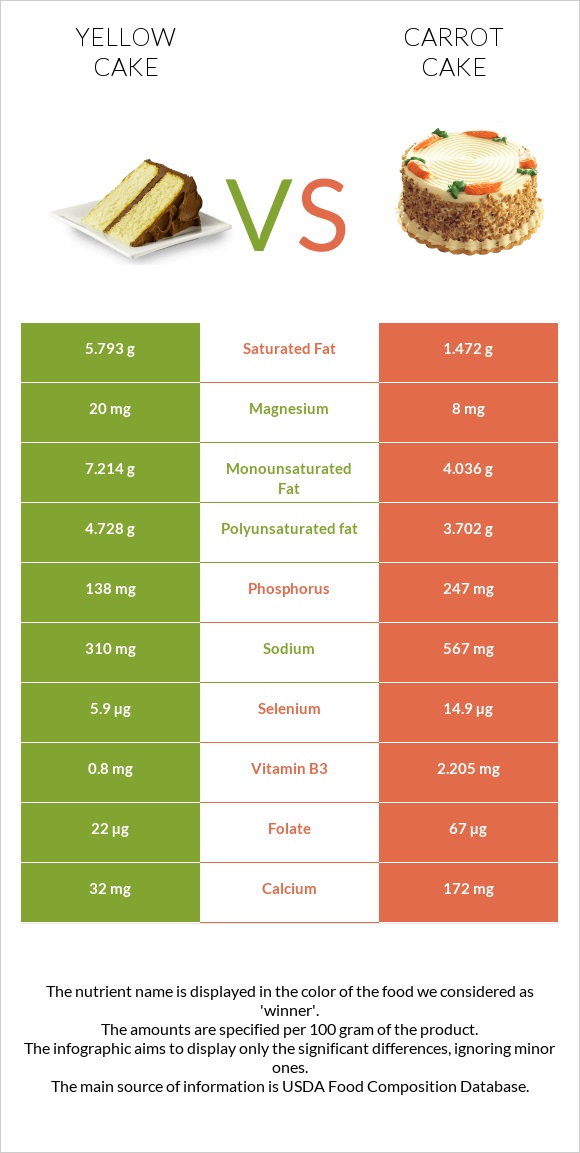Yellow cake vs. Carrot cake — In-Depth Nutrition Comparison
Compare
Important differences between yellow cake and carrot cake
- Yellow cake has more copper; however, carrot cake is richer in vitamin A, vitamin B1, selenium, phosphorus, calcium, manganese, and folate.
- Carrot cake's daily need coverage for vitamin A is 38% more.
- Yellow cake contains 4 times more saturated fat than carrot cake. Yellow cake contains 5.793g of saturated fat, while carrot cake contains 1.472g.
The food varieties used in the comparison are Cake, yellow, commercially prepared, with chocolate frosting, in-store bakery and Cake, pudding-type, carrot, dry mix.
Infographic

Infographic link
Mineral Comparison
Mineral comparison score is based on the number of minerals by which one or the other food is richer. The "coverage" charts below show how much of the daily needs can be covered by 300 grams of the food.
| Contains more MagnesiumMagnesium | +150% |
| Contains more IronIron | +12.8% |
| Contains more CopperCopper | +218% |
| Contains more ZincZinc | +110% |
| Contains less SodiumSodium | -45.3% |
| Contains more CalciumCalcium | +437.5% |
| Contains more PhosphorusPhosphorus | +79% |
| Contains more ManganeseManganese | +137.8% |
| Contains more SeleniumSelenium | +152.5% |
Vitamin Comparison
Vitamin comparison score is based on the number of vitamins by which one or the other food is richer. The "coverage" charts below show how much of the daily needs can be covered by 300 grams of the food.
| Contains more Vitamin EVitamin E | +∞% |
| Contains more Vitamin DVitamin D | +∞% |
| Contains more Vitamin KVitamin K | +∞% |
| Contains more Vitamin CVitamin C | +∞% |
| Contains more Vitamin AVitamin A | +1285.7% |
| Contains more Vitamin B1Vitamin B1 | +516.3% |
| Contains more Vitamin B2Vitamin B2 | +82.8% |
| Contains more Vitamin B3Vitamin B3 | +175.6% |
| Contains more Vitamin B5Vitamin B5 | +78.2% |
| Contains more Vitamin B6Vitamin B6 | +∞% |
| Contains more Vitamin B12Vitamin B12 | +∞% |
| Contains more FolateFolate | +204.5% |
All nutrients comparison - raw data values
| Nutrient |  |
 |
DV% diff. |
| Vitamin E | 4.5mg | 30% | |
| Vitamin K | 25.1µg | 21% | |
| Saturated fat | 5.793g | 1.472g | 20% |
| Vitamin B1 | 0.043mg | 0.265mg | 19% |
| Phosphorus | 138mg | 247mg | 16% |
| Selenium | 5.9µg | 14.9µg | 16% |
| Calcium | 32mg | 172mg | 14% |
| Manganese | 0.222mg | 0.528mg | 13% |
| Fats | 17.75g | 9.8g | 12% |
| Copper | 0.159mg | 0.05mg | 12% |
| Sodium | 310mg | 567mg | 11% |
| Folate | 22µg | 67µg | 11% |
| Vitamin A | 7µg | 97µg | 10% |
| Vitamin B3 | 0.8mg | 2.205mg | 9% |
| Carbs | 55.36g | 79.2g | 8% |
| Monounsaturated fat | 7.214g | 4.036g | 8% |
| Polyunsaturated fat | 4.728g | 3.702g | 7% |
| Fiber | 1.5g | 6% | |
| Vitamin B2 | 0.093mg | 0.17mg | 6% |
| Vitamin B6 | 0mg | 0.079mg | 6% |
| Cholesterol | 16mg | 0mg | 5% |
| Protein | 3.16g | 5.1g | 4% |
| Starch | 8.55g | 4% | |
| Magnesium | 20mg | 8mg | 3% |
| Iron | 2.03mg | 1.8mg | 3% |
| Vitamin B5 | 0.165mg | 0.294mg | 3% |
| Choline | 17.4mg | 3% | |
| Calories | 379kcal | 415kcal | 2% |
| Zinc | 0.42mg | 0.2mg | 2% |
| Vitamin B12 | 0µg | 0.04µg | 2% |
| Vitamin C | 0mg | 1.2mg | 1% |
| Vitamin D | 6 IU | 1% | |
| Potassium | 187mg | 169mg | 1% |
| Vitamin D | 0.2µg | 1% | |
| Fructose | 0.62g | 1% | |
| Net carbs | 53.86g | 79.2g | N/A |
| Sugar | 39.22g | N/A | |
| Trans fat | 1.313g | N/A | |
| Tryptophan | 0.061mg | 0% | |
| Threonine | 0.149mg | 0% | |
| Isoleucine | 0.186mg | 0% | |
| Leucine | 0.336mg | 0% | |
| Lysine | 0.142mg | 0% | |
| Methionine | 0.083mg | 0% | |
| Phenylalanine | 0.238mg | 0% | |
| Valine | 0.212mg | 0% | |
| Histidine | 0.109mg | 0% | |
| Omega-3 - ALA | 0.474g | N/A | |
| Omega-6 - Gamma-linoleic acid | 0.026g | N/A | |
| Omega-6 - Dihomo-gamma-linoleic acid | 0.001g | N/A | |
| Omega-6 - Eicosadienoic acid | 0.004g | N/A | |
| Omega-6 - Linoleic acid | 3.999g | N/A |
Macronutrient Comparison
Macronutrient breakdown side-by-side comparison
Protein:
3.16 g
Fats:
17.75 g
Carbs:
55.36 g
Water:
22.38 g
Other:
1.35 g
Protein:
5.1 g
Fats:
9.8 g
Carbs:
79.2 g
Water:
3.6 g
Other:
2.3 g
| Contains more FatsFats | +81.1% |
| Contains more WaterWater | +521.7% |
| Contains more ProteinProtein | +61.4% |
| Contains more CarbsCarbs | +43.1% |
| Contains more OtherOther | +70.4% |
Fat Type Comparison
Fat type breakdown side-by-side comparison
Saturated fat:
Sat. Fat
5.793 g
Monounsaturated fat:
Mono. Fat
7.214 g
Polyunsaturated fat:
Poly. Fat
4.728 g
Saturated fat:
Sat. Fat
1.472 g
Monounsaturated fat:
Mono. Fat
4.036 g
Polyunsaturated fat:
Poly. Fat
3.702 g
| Contains more Mono. FatMonounsaturated fat | +78.7% |
| Contains more Poly. FatPolyunsaturated fat | +27.7% |
| Contains less Sat. FatSaturated fat | -74.6% |



